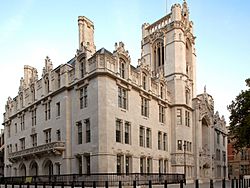R (E) v Governing Body of JFS facts for kids
Quick facts for kids R (E) v Governing Body of JFS |
|
|---|---|
 |
|
| Court | Supreme Court of the United Kingdom |
| Full case name | R (on the application of E) v Governing Body of JFS and the Admissions Appeal Panel of JFS |
| Argued | 27–29 October 2009 |
| Decided | 14 December 2009 |
| Neutral citation | [2009] UKSC 15 |
| Reported at | [2010] 2 AC 728, [2010] 2 WLR 153 |
| Case history | |
| Prior history | [2009] EWCA Civ 626 (affirmed) |
| Procedural history | [2009] UKSC 1 |
| Holding | |
| Appeal dismissed. The admissions process had resulted in discrimination on the grounds of race either directly (per the majority) or indirectly (per Lords Hope and Walker). Lords Rodger and Brown dissenting on both points. | |
| Case opinions | |
| Majority | Lords Phillips, Mance, Clarke, Kerr & Lady Hale (finding on the issue of direct discrimination) Lords Hope & Walker (finding on the issue of indirect discrimination) |
| Dissent | Lords Rodger & Brown |
| Area of law | |
| Discrimination, Education, Race Relations Act 1976 | |
R (E) v Governing Body of JFS [2009] UKSC 15 was an important court case in the United Kingdom. It was about whether the Jewish Free School (JFS) had treated a student unfairly. The school had rules about who could join based on their religion.
The United Kingdom Supreme Court is the highest court in the UK. In this case, most of the judges (five out of nine) decided that the school had treated some students unfairly. This unfair treatment was based on their race, which goes against the Race Relations Act 1976. Some judges said it was "direct discrimination," meaning it was clearly unfair. Others said it was "indirect discrimination," meaning the rules seemed fair but ended up being unfair to certain groups. This was one of the first big cases for the Supreme Court after it was created.
Contents
What Happened in the Case?
In October 2006, a father wanted his son to go to JFS. The father was Jewish, but his son's mother had become Jewish through a different Jewish group called the Masorti movement. JFS is an Orthodox Jewish school, which has stricter rules about who is considered Jewish.
Applying to JFS
The father asked the United Synagogue, a main Jewish organization, if his son could become Orthodox Jewish to get into JFS. He was told it could take a long time, maybe several years. He also learned that it was very hard to get into JFS because many students wanted to go there.
The father still applied for his son. However, he did not tell the school about the mother's history of converting to Judaism.
School's Decision and Appeal
By April 2007, the father had not given JFS all the information they asked for. The school then told him that his son probably would not get a place. This was because many students had applied, and the school was full.
The father tried to appeal the school's decision, but he was not successful. His son still did not get a place at JFS.
Taking the Case to Court
In July 2008, the father decided to take JFS to court. He said the school had treated his son unfairly because of his race.
However, a judge in a lower court, Mr Justice Munby, disagreed. He said that JFS's rules for choosing students were similar to those used by Christian or Islamic schools. He worried that if JFS's rules were called illegal, it could cause problems for many other religious schools.
The Supreme Court's Decision
The Supreme Court judges had different ideas about the case.
Direct Discrimination
Five of the judges, including Lord Phillips and Lady Hale, said the school had directly discriminated against the student because of his race.
Lord Clarke explained that the school's decision was based on the student's family background. He said that if a student was treated unfairly because their ancestors (like their mother's family) were not Orthodox Jewish, then that was discrimination based on their ethnic background. He asked if it was fair to treat all people who were not from Orthodox Jewish mothers differently.
Indirect Discrimination
Two other judges, Lord Hope and Lord Walker, thought there was indirect discrimination. They believed that the school's rules, while perhaps not meant to be unfair, still put certain Jewish people at a disadvantage.
Lord Hope said that calling the school's rules "racial" was confusing. He felt it was more about the effect of the rules, which made it harder for some Jewish people to get in.
Judges Who Disagreed
Two judges, Lord Rodger and Lord Brown, did not agree with the majority.
Lord Rodger said that the student's mother's background did not matter as long as she had converted to Judaism in a way that the school accepted. He meant that her race or origin was not the issue.
Both dissenting judges also felt that any indirect discrimination was acceptable because it helped the school keep its religious goals. Lord Brown also pointed out that Jewish law defines who is Jewish by birth, which is different from how some Christian faiths define membership.
See also
 | James Van Der Zee |
 | Alma Thomas |
 | Ellis Wilson |
 | Margaret Taylor-Burroughs |

